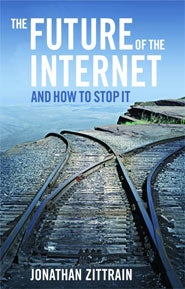In his most recent book, The Future of the Internet – And How to Stop It, Harvard Law School Professor Jonathan Zittrain ’95 paints a disheartening picture of the future of the Internet’s innovation and participatory opportunities. If we continue on our current trajectory, he warns, we will lose sight of the revolution that the Internet has brought to society.
Zittrain begins his explanation of why he sees reason to fear the future with an analysis of the history of the technology involved – the computer and the Internet. The secret to both the PC and the Internet’s success is that when both items were launched, they invited and depended on innovation by users. Zittrain warns that these “generative” characteristics are both what society values most and also what society stands to lose most readily.
“Our information technology ecosystem functions best with generative technology as its core,” Zittrain writes. “A mainstream dominated by non-generative systems will harm innovation as well as some important individual freedoms and opportunities for self-expression.”
Zittrain explains why people have begun to fear the openness once championed on the Internet. In recent history, there has been a rise in the amount of negative activity on the Internet.
As a result, individual users and companies developing technology have begun to make it impossible for users to participate in many “generative” activities. For example, mobile phones, video game consoles, TiVo, iPods, and BlackBerries are all “appliancized” products, Zittrain says, meaning only the vendor that created these products can change their functionality. New “contingently generative” platforms like the iPhone and Facebook Apps give their vendors unparalleled power to control the code that outsiders offer – control that will be used by regulators.
In exploring ways to preserve Internet, Zittrain says solutions can come from other generative success stories. One example is Wikipedia, which allows for vast participation and information exchange, and has fought off attempts to subvert or destroy it.
Drawing on Wikipedia’s accomplishments, Zittrain says sharing information on the Internet should be viewed as a social activity. In addition, using new technologies, a simple set of norms can be implemented and enforced by members of the community so that “relevant people and institutions can help secure the Net themselves instead of waiting for someone else to do it.”
Zittrain calls on individuals to find ways to self-police on the Internet in order to preserve the open, participatory nature. “The solutions to the generative dilemma will rest on the social and legal innovations as much as on technical innovation,” he says.
Debuting this spring, the book has already received rave reviews in numerous publications such as Time, Newsweek, the Financial Times, the Economist, BBC News, The American Prospect, and the USA Today. Read excerpts of the reviews on the book’s Web site.
